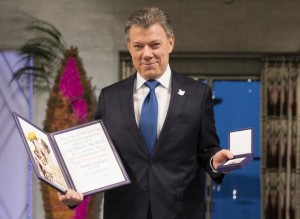Santos accepts Nobel for peace deal, urges shift in drug war

Nobel Peace Prize Laureate Colombian President Juan Manuel Santos poses with the medal and diploma following the Nobel awarding ceremony at the City Hall in Oslo, Saturday Dec. 10, 2016. Colombian President Juan Manuel Santos is awarded this year’s Nobel Peace Prize for his efforts to bring Colombia’s more than 50-year-long civil war to an end. (Photo by HAAKON MOSVOLD LARSEN/NTB scanpix via AP)
STOCKHOLM — Colombian President Juan Manuel Santos accepted the Nobel Peace Prize on Saturday, saying it helped his country achieve the “impossible dream” of ending a half-century-long civil war.
A smiling Santos received his Nobel diploma and gold medal at a ceremony in Oslo, Norway, for his efforts to end a conflict that has killed 220,000 people and displaced 8 million.
“Ladies and gentlemen, there is one less war in the world, and it is the war in Colombia,” the 65-year-old head of state said, referring to the historic peace deal this year with leftist rebels from the Revolutionary Armed Forces of Colombia, or FARC (Fuerzas Armadas Revolucionarias de Colombia).
Santos used his acceptance speech to celebrate the end of the longest-running conflict in the Americas, pay tribute to its victims and call for a strategy shift in another, related war — on drug trafficking worldwide.
Just a few years ago, imagining the end of the bloodshed in Colombia “seemed an impossible dream, and for good reason,” Santos said, noting that very few Colombians could even remember their country at peace.
Article continues after this advertisementThe initial peace deal was narrowly rejected by Colombian voters in a shock referendum result just days before the Nobel Peace Prize announcement in October.
Article continues after this advertisementMany believed that ruled out Santos from winning this year’s prize, but the Norwegian Nobel Committee “saw things differently,” deputy chairwoman Berit Reiss-Andersen said.
“The peace process was in danger of collapsing and needed all the international support it could get,” she said in her presentation speech.
A revised deal was approved by Colombia’s Congress last week.
Several victims of the conflict attended the prize ceremony, including Ingrid Betancourt, who was held hostage by FARC for six years, and Leyner Palacios, who lost 32 relatives including his parents and three brothers in a FARC mortar attack.
“The FARC has asked for forgiveness for this atrocity, and Leyner, who is now a community leader, has forgiven them,” the president said. Palacios stood up to applause from the crowd.
FARC leaders, who cannot travel because they face international arrest warrants by the US, were not in Oslo. A Spanish lawyer who served as a chief negotiator for FARC represented the rebel group at the ceremony.
Colombians have reacted to Santos’ prize with muted emotion amid deep divisions over the peace deal. The vast majority didn’t bother to vote in October’s referendum. For many Colombians in big cities, Santos’ overriding focus on ending a conflict that had been winding down for years has diverted attention from pressing economic concerns.
Santos’ speech made a reference to fellow Nobel laureate Bob Dylan, this year’s surprise winner of the literature award, by citing the lyrics of one of his most famous songs, “Blowin’ in the Wind.”
The president also used the Nobel podium to reiterate his call to “rethink” the war on drugs, “where Colombia has been the country that has paid the highest cost in deaths and sacrifices.”
Santos has argued that the decades-old U.S.-promoted war on drugs has produced enormous violence and environmental damage in nations that supply cocaine, and needs to be supplanted by a global focus on easing laws prohibiting consumption of illegal narcotics.
“It makes no sense to imprison a peasant who grows marijuana, when nowadays, for example, its cultivation and use are legal in eight states of the United States,” he said.
The other Nobel Prizes were presented at a separate ceremony in Stockholm to the laureates in medicine, chemistry, physics and economics. Dylan wasn’t there — he declined the invitation, citing other commitments.
The crowd still gave Dylan a standing ovation after a Swedish Academy member praised his work in a speech.
An awkward moment ensued as American singer-songwriter Patti Smith, performing Dylan’s “A Hard Rain’s A-Gonna Fall,” forgot the lyrics midway through.
“I apologize. I’m sorry, I’m so nervous,” Smith said, asking the orchestra to start over, as the formally dressed audience comforted her with gentle applause./rga